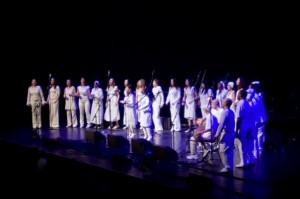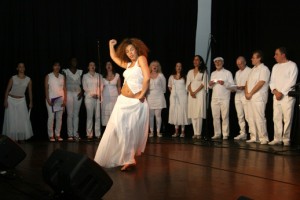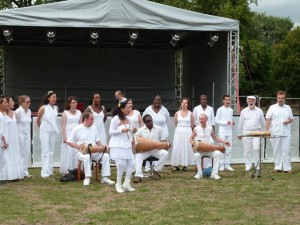London’s Lucumi Choir—a non-audition, all-volunteer group—presents stirring vocal and percussion arrangements of Santeria liturgical songs and contemporary Cuban music. Established in 2006, this community-based group attracts artists from around the world. Founder and director Daniela Rosselson speaks about the experience of growing the choir over the past several years.

When did you first encounter Cuban music?
I first encountered Cuban music in the late 1970s. First, via music with Cuban roots, such as salsa, and also via my father, who was interested in the nueva trova movement in Cuba.
After that, the first couple of live bands I saw at Ronnie Scott’s [a London jazz club] in the early 1980s were in the shape of Irakere and Gonzalo Rubalcaba’s Grupo Proyecto. I also saw the Conjunto Folklórico, which came to visit the UK at that time.
How did you get the idea for the London Lucumi Choir, especially its being a non-audition, volunteer group? What is the meaning of the name?
I am a initiate of the Lucumi faith also known as Santeria. I have been practicing this faith for over 24 years, and there is a whole liturgy of spiritual songs associated with it. The songs are beautiful and I had the idea of forming the choir since I wished to have a large collection of voices singing them with modern vocal arrangements.
I am also a musician, singer, arranger, and teacher, and I find all my skills and interests combined in this project. The choir is non-audition since it is a community choir, and therefore does not wish to exclude any member of the community.
Many people believe they cannot sing. This choir encourages people like that, and indeed most people can and should sing. As a teacher of singing, I have very rarely encountered truly tone-deaf people. There is very little to no funding these days for the arts, and therefore the choir is run by myself on a voluntary basis although I receive a small token amount for teaching every week.

How do you describe the music that the choir performs? What are some of the different cultures and traditions that it represents?
The music consists mostly of spiritual songs from the Lucumi tradition although we also perform other Afro-Cuban genres, such as rumba, tumba francesa, palo, and so on.
We present songs from contemporary Cuba. These songs are now sung all over the world since the Lucumi faith has become widespread and there are practitioners in many countries, including the United States.
We also have performed a contemporary piece of music by Nigerian composer Juwon Ogungbe based on a Yoruban tale. The Lucumi tradition originates from the Yoruban lands of West Africa.
What has your experience been like growing the choir over the past several years? How many members does it currently have?
This has been my first community project. We have between 14 and 25 members, but not everyone turns up to all rehearsals. We have had over 65 people pass through the choir’s doors [since we began in 2006] and we have around 15 original members.
Running the choir is a difficult project—commitment is the most challenging issue with people continuously coming and going. Since people see the project as a hobby rather than a job, they have a relaxed attitude in terms of participation. That is the most difficult problem, especially in terms of performing and recording. However, it is also very rewarding.
There are fewer egos [in the Lucumi Choir] than I have encountered with professional music projects, and I have seen many members develop from being quite shy and unconfident to singing lead solo parts. I have also noticed that people’s aural and dance skills improve with time and dedication. People that found harmony difficult now sing harmonies unprompted.
The most challenging projects that we have done up until this point have been singing in the BBC Radio 3 Choir of the Year competition in 2008, and learning the piece by Juwon Ogungbe by heart. We have also performed this work with dancers, which was a new challenge. I am always looking for new and interesting projects to do.

Because this is a community-based choir, do you find that most of your support is local, or do you find that you attract interest from people across the nation and even worldwide?
Interest in the choir is worldwide, and we have had members visit from the United States and Canada for the experience of singing with us. Most people that join are looking for a choir with a difference, and have either a spiritual interest in the Santeria faith or have an interest in Cuban or African culture in the diaspora.
Members come from all over and they must really want to take part since it is quite a distance for some people. The fact that we sing accompanied by drums also inspires people that want to sing, but do not want a stuffy environment. Others love to sing, but cannot read music and this choir does not require them to do that.
What is the album project you are currently working on? When will it be released?
We have been together for six years and so we decided to make an album. It will be released later on this year. It contains spiritual and social songs, and features some of Cuba’s top percussionists performing with members of the choir. I hope that people will buy the CD and help keep the choir going.
To experience music by the London Lucumi Choir and to learn more about the history and traditions behind it, visit the group’s website and ReverbNation page.
